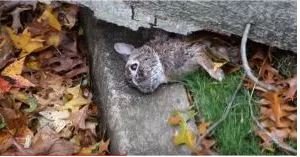
Does nature know best? Animals in the wild suffer all the time from accidents, injuries, diseases, hunger, and thirst in situations in which we could help them. Yet many people believe that we shouldn’t “interfere” in nature because it seems wrong somehow. But why? Mother Nature is not exactly benevolent. Things exists the way they do because of natural processes that gave rise to certain organisms and ecosystems. It doesn’t mean anything. Why should natural things have intrinsic value in and of themselves? Ecosystems don’t have feelings. They can’t be harmed or helped by our actions. So isn’t the right thing to do to care about those beings who can suffer and who we might be able to help?
When it comes to humans, what we care about is their wellbeing, and we usually feel the same way about the domesticated animals we live with like dogs and cats. So why do we suddenly switch our thinking when it comes to wild animals? Why do we consider them as a part of nature rather than feeling beings living in it?
Of course, sometimes wild animals get trapped in wells or fences so we may feel some responsibility for their plight. But really, a suffering animal doesn’t care why they are suffering – due to a human or a natural cause.
It’s true that we if we intervened in large ways we would change ecosystems, but as long as it doesn’t do greater harm, does that matter? Ecosystems change all the time on their own anyway. With climate change and population growth and technological progress, we are going to be redesigning the entire world soon anyway, so we have to decide whether we want to leave wild animals to suffer because we like the idea of natural processes for their own sake, or whether we care about sentient individuals and their wellbeing.
There are already many feasible ways of helping wild animals on a small scale. There are feeding and watering programs in national parks, and individuals and communities who come together to rescue wild animals from accidents, illness, forest fires and other natural disasters.
http://www.animal-ethics.org/rescuing-trapped-animals/
There are many, many more wild animals than domesticated animals and humans.
https://steemit.com/animals/@goose/how-many-wild-animals-are-there
Most of the world’s suffering takes place in the wild. While we are planning for a world that alleviates human suffering, let’s think about helping wild animals, too. We may not be able to help every insect that may be suffering, but there are plans we could be thinking about now to help some animals. Elephants are a good example to start with because they have no natural predators and they usually die prematurely due to preventable diseases or dental conditions that could be corrected relatively inexpensively.
https://steemit.com/animalsinsociety/@goose/a-proposal-for-an-animal-welfare-state
What do you think?

We should always help other earthlings if we can when they struggle
This is great ethical point for debate.
I think most people don't think about it because the suffering is unseen
I think a lot of people would help a wild animal if they were in a position to do so.
I think you're absolutely right. In fact, people have to train themselves not to when it's right in front of their eyes. I've seen wildlife documentaries where the crew was watching a baby elephant drown in the mud or something and all the while commenting how sad it was but how wrong it would be to help (why?).
A friend of mine calls wildlife documentaries snuff videos because so many people enjoy watching animals die terrible deaths by predation or other causes.
I think if you can and want to, then one should. The rationale of "if everyone does it it will change ecosystems" won't really matter in this case because most people just won't. I try to keep a rifle in my truck for the off chance I will come across a freshly injured animal along the highway. If I see an animal which will definitely die from the injury then I can at least stop the suffering.